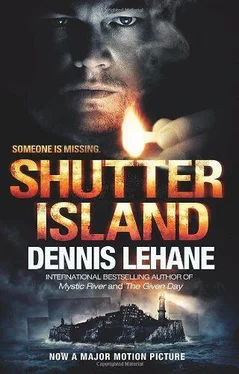Dennis Lehane
SHUTTER ISLAND
For Chris Gleason and Mike Eigen.
Who listened. And heard.
And sometimes carried.
…must we dream our dreams and have them, too?
—Elizabeth Bishop, “Questions of Travel”
FROM THE JOURNALS OF DR. LESTER SHEEHAN
MAY 3, 1993
I haven’t laid eyes on the island in several years. The last time was from a friend’s boat that ventured into the outer harbor, and I could see it off in the distance, past the inner ring, shrouded in the summer haze, a careless smudge of paint against the sky.
I haven’t stepped foot on it in more than two decades, but Emily says (sometimes joking, sometimes not) that she’s not sure I ever left. She said once that time is nothing to me but a series of bookmarks that I use to jump back and forth through the text of my life, returning again and again to the events that mark me, in the eyes of my more astute colleagues, as bearing all the characteristics of the classic melancholic.
Emily may be right. She is so often right.
Soon I will lose her too. A matter of months, Dr. Axelrod told us Thursday. Take that trip, he advised. The one you’re always talking about. To Florence and Rome, Venice in the spring. Because Lester, he added, you’re not looking too well yourself.
I suppose I’m not. I misplace things far too often these days, my glasses more than anything. My car keys. I enter stores and forget what I’ve come for, leave the theater with no recollection of what I’ve just seen. If time for me really is a series of bookmarks, then I feel as if someone has shaken the book and those yellowed slips of paper, torn matchbook covers and flattened coffee stirrers have fallen to the floor, and the dog-eared flaps have been pressed smooth.
I want to write these things down, then. Not to alter the text so that I fall under a more favorable light. No, no. He would never allow that. In his own peculiar way, he hated lies more than anyone I have ever known. I want only to preserve the text, to transfer it from its current storage facility (which frankly is beginning to moisten and leak) to these pages.
Ashecliffe Hospital sat on the central plain of the island’s northwestern side. Sat benignly, I might add. It looked nothing like a hospital for the criminally insane and even less like the military barracks it had been before that. Its appearance reminded most of us, in point of fact, of a boarding school. Just outside the main compound, a mansarded Victorian housed the warden and a dark, beautiful Tudor minicastle, which had once housed the Union commander of the northeastern shoreline, served as the quarters of our chief of staff. Inside the wall were the staff quarters—quaint, clapboard cottages for the clinicians, three low-slung cinder block dormitories for the orderlies, the guards, and the nurses. The main compound was composed of lawns and sculpted hedges, great shady oaks, Scotch pines, and trim maples, apple trees whose fruit dropped to the tops of the wall in late autumn or tumbled onto the grass. And in the center of the compound, twin redbrick colonials on either side of the hospital itself, a structure of large, charcoal stones and handsome granite. Beyond were the bluffs and the tidal marsh and a long valley where a collective farm had sprung up and then failed in the years just after the American Revolution. The trees they planted survived—peach and pear and chokeberry—but no longer bore fruit, and the night winds often came howling into that valley and screeched like cats.
And the fort, of course, which stood long before the first hospital staff arrived, and stands there still, jutting out of the southern cliff face. And the lighthouse beyond, out of service since before the Civil War, rendered obsolete by the beam of Boston Light.
From the sea, it didn’t look like much. You have to picture it the way Teddy Daniels saw it on that calm morning in September of 1954. A scrub plain in the middle of the outer harbor. Barely an island, you’d think, so much as the idea of one. What purpose could it have, he may have thought. What purpose.
Rats were the most voluminous of our animal life. They scrabbled in the brush, formed lines along the shore at night, clambered over wet rock. Some were the size of flounder. In the years following those four strange days of late summer 1954, I took to studying the rats from a cut in the hill overlooking the northern shore. I was fascinated to discover that some of the rats would try to swim for Paddock Island, little more than a rock in a cupful of sand that remained submerged twenty-two hours out of every day. When it appeared for that hour or two as the current reached its lowest ebb, sometimes they’d swim for it, these rats, never more than a dozen or so and always driven back by the riptide.
I say always, but no. I saw one make it. Once. The night of the harvest moon in October ’56. I saw its black moccasin of a body dart across the sand.
Or so I think. Emily, whom I met on the island, will say, “Lester, you couldn’t have. It was too far away.”
She’s right.
And yet I know what I saw. One fat moccasin darting across the sand, sand that was pearl gray and already beginning to drown again as the current returned to swallow Paddock Island, swallow that rat, I assume, for I never saw it swim back.
But in that moment, as I watched it scurry up the shore (and I did, I saw it, distances be damned), I thought of Teddy. I thought of Teddy and his poor dead wife, Dolores Chanal, and those twin terrors, Rachel Solando and Andrew Laeddis, the havoc they wreaked on us all. I thought that if Teddy were sitting with me, he would have seen that rat too. He would have.
And I’ll tell you something else:
Teddy?
He would have clapped.
TEDDY DANIELS’S FATHER had been a fisherman. He lost his boat to the bank in ’31 when Teddy was eleven, spent the rest of his life hiring onto other boats when they had the work, unloading freight along the docks when they didn’t, going long stretches when he was back at the house by ten in the morning, sitting in an armchair, staring at his hands, whispering to himself occasionally, his eyes gone wide and dark.
He’d taken Teddy out to the islands when Teddy was still a small boy, too young to be much help on the boat. All he’d been able to do was untangle the lines and tie off the hooks. He’d cut himself a few times, and the blood dotted his fingertips and smeared his palms.
They’d left in the dark, and when the sun appeared, it was a cold ivory that pushed up from the edge of the sea, and the islands appeared out of the fading dusk, huddled together, as if they’d been caught at something.
Teddy saw small, pastel-colored shacks lining the beach of one, a crumbling limestone estate on another. His father pointed out the prison on Deer Island and the stately fort on Georges. On Thompson, the high trees were filled with birds, and their chatter sounded like squalls of hail and glass.
Out past them all, the one they called Shutter lay like something tossed from a Spanish galleon. Back then, in the spring of ’28, it had been left to itself in a riot of its own vegetation, and the fort that stretched along its highest point was strangled in vines and topped with great clouds of moss.
“Why Shutter?” Teddy asked.
His father shrugged. “You with the questions. Always the questions.”
“Yeah, but why?”
“Some places just get a name and it sticks. Pirates probably.”
“Pirates?” Teddy liked the sound of that. He could see them—big men with eye patches and tall boots, gleaming swords.
Читать дальше












